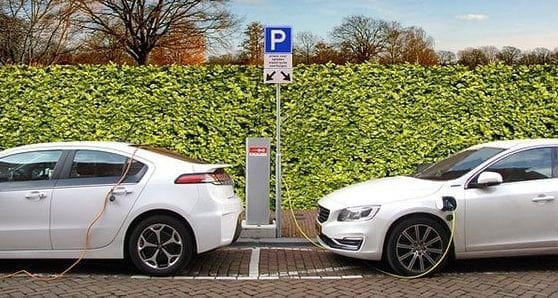 American actress Alexandra Paul summarized the sentiment of much of the world when she said, “The cars we drive say a lot about us.”
American actress Alexandra Paul summarized the sentiment of much of the world when she said, “The cars we drive say a lot about us.”
The climate crisis also says a lot about us as a society and one of greatest culprits related to that crisis is the automobile.
As a result, many people are choosing to switch to electric cars and trucks, and the auto industry is responding by increasing production of these vehicles.
Is this is the best and only solution?
While electric cars don’t create exhaust, the electricity that powers them has to come from somewhere, and that process inevitably comes with environmental, social and economic costs.
The cars also need to be manufactured and manufacturing creates pollutants.
There are many components in an electric car that are different from those in fossil-fuel-burning cars. We need to remember that this too will have a far-reaching global impact, as does the mass production of cars, which began more than 100 years ago.
In the early 20th century, the demand for rubber increased at an astronomical rate. King Leopold II of Belgium gladly responded to this by pillaging the Congo Free State, making it his personal rubber plantation. This resulted in millions of deaths in what could easily be called the first genocide of the century.
Ironically, today we turn to the Congo again, this time for cobalt to use in lithium-ion batteries for electric cars.
The Congolese infrastructure has changed little since the time of Leopold. It’s still dominated by corruption, violence and organized crime.
As the auto industry shifts to electric cars, the global community has a choice. Will we use this opportunity to make life better for people in the Congo or will we allow the ghost of King Leopold to continue to inflict suffering on a beautiful nation?
Perhaps there are even more fundamental questions we need to ask concerning our cars.
For example, how are they are impacting our health? When we drive, we aren’t exercising. Many are surprised to learn that city dwellers tend to be healthier than those who live in the country. While this is a multifaceted statistic, one thing is clear: city dwellers spend more time walking and less time driving.
Even those of us living in smaller cities can embrace opportunities to get out of our vehicles. For example, 20 years ago I got a teaching position within walking distance of my home. I sold one family car and bought a really good backpack.
Walking to and from work has been a wonderful experience. I easily exceed the daily 10,000-step minimum encouraged by health experts. I also really enjoy every aspect of walking, even in the cold of winter. When I see people warming up their cars and scraping off their windshields, I realize how fortunate I am.
Of course, not everyone can walk to work. We often have to rely on our vehicles because we live far away, or because we need to pick up and drop off our children.
We need to begin to make choices that will have a positive impact on the environment. Getting an ethically-produced electric car or a fuel-efficient gas- or diesel-powered vehicle is a step in the right direction. And big-city dwellers know that public transportation, ride-share services and bike lanes can reduce or even eliminate the environmental impact of car ownership, not to mention the cost.
There’s no reason why these programs can’t be expanded in smaller communities.
The bottom line is that global warming is very real and much of it has to do with our love affair with the automobile. Perhaps it’s time to consider what the car we’re not driving says about us as well.
Gerry Chidiac is an award-winning high school teacher specializing in languages, genocide studies and work with at-risk students.
The views, opinions and positions expressed by columnists and contributors are the author’s alone. They do not inherently or expressly reflect the views, opinions and/or positions of our publication.


